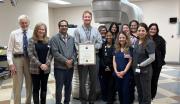
Life after cancer treatment can be a time of joy and optimism for survivors, but it also can be one of unease and anxiety. Understandably, the fear of the unknown can be overwhelming and detrimental to the patient’s ability to lead a healthy life. This is why the care team at Shore Cancer Center makes it a priority to help support survivors with their feelings of uncertainty post-treatment.
Tiffany Pompa, MD, who is triple certified in hematology, oncology, and internal medicine, explains that anxiety levels and behavior is much different for a patient with cancer that is curable and one that is not.
For those who have cancer that is curable, patients who have been accustomed to seeing their doctor every few weeks to a situation where they are not scheduled to see their doctor for three months and then six months. This can be drastic for many survivors, so Dr. Pompa makes it a priority to address this change to help prepare survivors as they begin their life after cancer.
“I always have an honest talk with my patients as they enter the post treatment phase, and reassure them that feelings of anxiety are normal thoughts,” said Dr. Pompa. “While they may feel differently, it does not mean that something is wrong or they are going to be sick again. I try and prepare them for the feelings of doubt and uncertainty and provide ways to overcome them. I try and take the fear out of their minds by listening to them and staying positive.
“Of course, my patients can call me whenever they want,” continued Dr. Pompa. "It is so important to me that my patients can say, 'I have Dr. Pompa in my corner if I need her'."
Sometimes people forget what “normal” is because everything has revolved around the cancer for so long. Dr. Pompa shared this example. “One of my breast cancer survivors misplaced her keys and thought that the treatment had affected her memory. I then told her I’ve misplaced my keys a dozen times, and asked her if she had done so prior to her diagnosis. She said laughed and said she did many times.”
For those with non-curable cancers, great stress and anxiety is felt around scans and the time leading up to those appointments. “I try to ease their minds by reinforcing that this is what I am trained to do,” said Dr. Pompa. “I let them know that this is what I went to school for and this is what I have spent my life focused on. I try and take the burden off them as they worry about with the next step is going to be. I tell them I will take care of that. They should concentrate on their family, friends and whatever makes them happy. The world is unpredictable and a lot of things are out of your control. So, realize what you can control and make the most of it.”
While some patients may need professional counseling, many can thrive in post treatment by returning to doing what they did before treatment began.
Dr. Pompa advises her patients to make sure they do something fun every day, and that they can still be who they were before they were diagnosed.
“They don’t have to constantly think of themselves as a cancer patient,” said Dr. Pompa. “I encourage them to participate in some physical activity. Meditation and journaling can be helpful too. Patients can also look for survivor workshops which offer a variety of tools to help adjust to life after treatment.”
One of these workshops is held by the Cape Atlantic Coalition for Health titled, “Cancer Thriving & Surviving.” The workshop covers a wide range of topics, including: Techniques to deal with problems such as frustration, fatigue, pain, isolation, poor sleep and living with uncertainty. This free course also offers advice and recommendations related to exercise, nutrition, and communication. To learn more about the Cape Atlantic Coalition for Health’s Cancer Thriving & Surviving workshops, call 609-653-3923.










